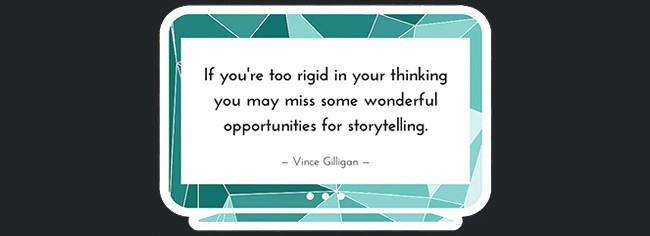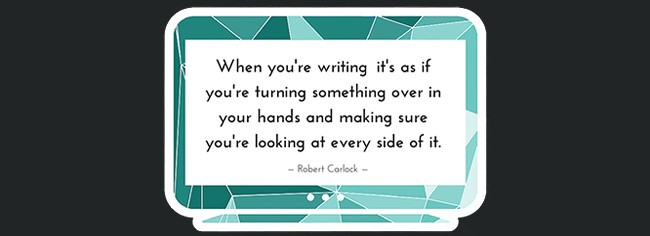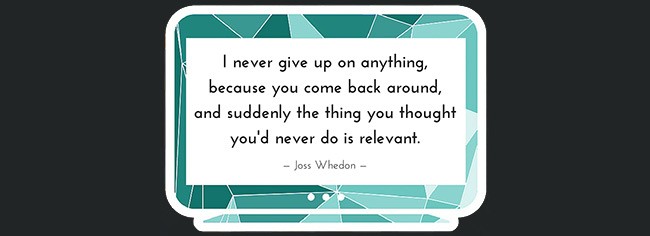I finished a marathon this past weekend. After training for hours every Saturday morning since I was a kid, after purchasing all the right gear, after maintaining a strict diet of sugary cereal marshmallows in tinted milk, I finally finished my first marathon.
That is, my first Netflix marathon.
With binge-watch being the word of the year in 2015, it's clear that more and more people have been participating in Netflix marathons. Or, at least, that's what I'm convincing myself. (I might add, though, that it's not super fair that Netflix gives you only fifteen seconds to decide whether you're going to watch all three seasons of Orange Is the New Black in 38 ½ hours.)
Although binge-watching a Netflix series is probably not the most productive use of a writer's time, maybe we can get some use out of it. For the writers among us who pretend that having Netflix on "in the background" makes us more productive, there is at least the excuse that many of our favorite television shows are superbly written.
Luckily, the writers of your favorite shows have some very useful writing tips to share with you. Now you can tell your spouse/friend/children that you're doing "research" when you turn on the TV. Don't worry; we can keep a secret. You have our permission to watch, watch, and watch some more.
Vince Gilligan
(Breaking Bad, Better Call Saul, The X-Files)
It's always a conscious choice to surprise people. That is always the mandate. Today, with all the wonderful—and sometimes not so wonderful—entertainment it's harder than ever to keep things interesting, so you have to surprise people.
Having a rock solid idea of how it all should end is counterproductive. If you're too rigid in your thinking you may miss some wonderful opportunities for storytelling. (Source)
These two separate writing tips from Vince Gilligan are actually related. Vince Gilligan, unsurprisingly, thinks the element of surprise is important in writing. This is true not only for your audience, though, but also for you. You have to aim to surprise people, but you obviously can't aim to surprise yourself. That's why Vince Gilligan advises that you remain flexible in your writing. Sticking to an outline, do or die, will have you missing the smell of the roses because you'll be too busy sprinting down the garden path.

Anthony Horowitz
(Foyle's War, Murder in Mind, William Tell)
Why are you writing a novel? Do you want to be published? Do you want to self-publish? Do you want to be rich? I write because I love telling stories and because there is nothing else I want to do. Even if no one bought my books, I know I would go on writing . . . And that's the best attitude. Don't worry about publishers, agents, critics, partners, friends or even readers. Believe me that deals and bestseller lists are the part of writing that I enjoy least. Immerse yourself in your work. Believe in yourself and enjoy what you're doing. There is nothing quite as fulfilling as the act of writing. The rest can look after itself. (Source)
Anthony Horowitz highlights that the act of writing is actually what writing is all about. One more time, with us: writers write! Between obtaining advice and making outlines and sorting through critiques and making revisions and reading reviews, actually physically writing seems to encompass so little of a writer's world. We often forget that it's the whole point. So, remember! Take a moment to think about why you write in the first place. There's no wrong answer, but there are many answers that will make your career as a writer seem much more difficult (and much less enjoyable).
Tina Fey
(Unbreakable Kimmy Schmidt, Saturday Night Live, 30 Rock)
It's a great lesson about not being too precious about your writing. You have to try your hardest to be at the top of your game and improve every joke you can until the last possible second, and then you have to let it go. You can't be that kid standing at the top of the waterslide, overthinking it . . . You have to let people see what you wrote. (Source)
Writers are perfectionists. (A writer who's also an editor is a deadly combo, but I won't get into that right now.) We'll write and rewrite until we totally second-guess ourselves and send the document to the trash. However, the balance that Tina Fey has mastered is important. It's impossible to be perfect, and it's far better to let people see you belly flop off the high dive than to hide in the shallow end of the pool your whole life.

Marta Kauffman
(Friends, Joey, Veronica's Closet, Dream On)
1) Not everyone is funny; people think if an idea is funny, they are funny. Very often, they write jokes that are not funny. Then don't do comedy. 2) Learn what makes good writing. Most [new] writers say a character's name a thousand times. Writing [should be like] writing a haiku—be judicious with dialogue. Use as few words as possible to make something make sense. Scenes are not really about the dialogue, but what is underneath. 3) Lots of sex. (Source)
Marta Kauffman touches on something that new writers very often overlook: the intended meaning behind the words. Often, dialogue by new writers is obvious and shallow. Characters communicate exactly what they want to say and tell readers exactly what they're going to do. And that's so unauthentic to real life! Writing shouldn't tell readers how to feel; it should make them feel it. Let them see what's underneath.
Jack Burditt
(Mad About You, Frasier, 30 Rock, The Mindy Project, Last Man Standing)
The old cliché is "keep writing," but I really believe that's a huge part of it. I'm so much better now than I was three years ago when I started 30 Rock. I feel like it's a continual learning process, the muscle that has to be exercised . . . Keep working at it. And try and learn your craft. It is a craft. There are great courses and good books on it. Devour everything. (Source)
Jack Burditt divides his writing tips into two classes: action and reaction. It's important to stay in motion, as a writer. Writers are continuously writing. That's what makes a writer a writer. And like Burditt says, it's a muscle that needs exercising, so motion is absolutely vital. Staying still, not writing, is when a writer becomes an "aspiring author." And nobody wants that. Further, Burditt comments on reaction. Like an athlete, you can't just exercise; you also have to consume quality items. If you devour the stuff that's good for you and keep moving those muscles at the same time, you'll be in great shape as a writer in no time.
Julian Fellowes
(Downton Abbey)
All drama is about tension. That terrible things are going to happen, the risk of this or that. It's very difficult when a couple gets together in a series and they're frankly well-suited and they get married. You know you have to push them over a cliff or something because there's nothing more to be said. (Source)
A good story does not exist without conflict. It's easy to fall in love with your characters, but you have to make them suffer. Making them suffer throughout the story ensures that you won't have to push them off a cliff later. If they're too happy, well, try not to get too attached, because somebody's gotta go over that cliff. Julian Fellowes is not afraid to be the first to push.

Robert Carlock
(Unbreakable Kimmy Schmidt, 30 Rock, Joey, Friends)
There's no more visceral reaction than people not laughing. But when you say something that totally bombs you hope someone else says, "Oh what I thought you were going to say was X," or "What if it went there?" When you're writing, it's as if you're turning something over in your hands and making sure you're looking at every side of it. (Source)
Robert Carlock outlines the importance of having an audience for your writing. While this is easier for screenwriters,
that doesn't mean it's impossible for fiction writers. It's important that you're not shy about having your material read. You can also throw a friend a hypothetical question (e.g., "What would you do if you were in this situation?") to see where to take your story next. Never underestimate a simple comment made by a friend or family member. They'll likely have different ideas than those you could come up with alone. If you don't trust the opinions of your friends or family, though, there are always professionals who would be happy to help you.

Paula Pell
(Saturday Night Live)
Rewriting movies just goes on and on and on, sometimes I think to the point of what we always called at SNL "lateral moves." That's when you're just changing something just to change it. I think that happens a lot in sitcoms especially. The problem will be that there's just too many cooks in the pot and everyone's got an opinion and they all wanna give their two cents and have it changed so they can know that they had a part of it. And then sometimes the fabric of it gets pulled apart and then you go back to the way it was originally and it's hard not to get frustrated with that. The best you can do is try to get to a place where you can avoid getting into those situations. (Source)
Making changes for the sake of making changes can be hazardous. Trying to be "inventive" and "new" and "fresh" is hailed as important, but it's more important to remember that you can't go wrong with a classic. Remember: being inventive only works once. The reliability of the structure of a tried-and-true genre shouldn't be underrated. And changing something good, while it can be successful, can also become the target of ridicule for years to come. I don't know about you, but I'd much rather read another gumshoe detective story than a "unique" novel about a sparkly vampire.
Dan Harmon
(Community, Rick and Morty)
Repeat [the writing process] every day until rich people give you money to do it for them. Buy a house, become one of them and hire poor people to do it for you. Somewhere in there try to get a dog and a funny girlfriend or it’s all pretty pointless. (Source)
Maybe you need screenwriting tips that are more concrete. Take the writing process of Dan Harmon, and try it out for yourself! As a writer, you will know that only writing processes that include rewriting and non-believers are to be trusted, so you can go into this one with full confidence that it's going to work beautifully. (Also, it's Dan Harmon. Come on, it doesn't get any better than that.)
Mike Schur
(The Office, Parks and Recreation, Brooklyn Nine-Nine)
You just hang out with people who are good at it and learn everything that they do. I don't know that there are little pithy aphorisms or anything that I can point to about how to magically make great television. It comes from kind of grinding it out day after day after day with people who know what they're doing. (Source)
Imitation is the sincerest form of flattery, right? Mike Schur knows that writers are little more than the culmination of all they've consumed and loved. Copy the people you've stayed up all night reading. Not literally, of course. Good screenwriters copy; great screenwriters steal . . . Advice, that is! So, read their quotes, and follow their processes. And keep writing! Again, writers write.

Jenji Kohan
(Orange Is the New Black, Weeds, Tracey Takes On…)
I think that shows that are completely dramatic are a lie because people use humor to cope. That is how we deal with things. In the darkest situations, there is humor. And if you don't show that, you're not being true to real life. I think it would be exhausting and depressing to write, to watch, and to live if it was just focused on drama. Also, I think the humor really highlights the pathos and the struggle, and you can slam it up against drama, and it makes both shine . . . I think it reflects reality; I think people use humor to survive the most horrific situations.
Humor writers, rejoice! Writing tips are not all about conflict and danger and failure. Writing is usually about capturing everyday life, where people suffer and die and fail but also laugh and hope and hunt for mysterious chickens. Since the truth is stranger than fiction, you can draw from reality to bring humor into writing, which will in turn make your writing that much more honest.
Mitch Hurwitz
(Arrested Development)
I don't think I would have written my first spec script if I had known how unlikely it was to get a writing job. And I don't think I would have tried creating Arrested [Development] if I really thought "look at the data of what's already been developed. They won't make this" but I should have—that was the evidence that existed . . . I think that everyone has to jump off that cliff and make that assumption in their own work—because the truth is, even if it doesn't happen, you have a more interesting life if you're to sit down and write a novel than doing the math on the likelihood of it getting published. (Source)
Never underestimate the importance of a first draft. A world without Arrested Development is a world I'm so glad I never have to live in.
Joss Whedon
(Buffy the Vampire Slayer, Firefly, Angel, Agents of S.H.I.E.L.D.)
You know what? I never give up on anything, because you come back around, and suddenly the thing you thought you'd never do is relevant. I talked with my wife about Much Ado About Nothing for years, and it was always like, "I don't feel like my take on the material is solid enough to merit that." And then one day I woke up and said, "Wait a minute, I know exactly what I think that movie's about." I definitely have had a lot of projects that stalled, but I never know which one's going to suddenly pick itself up. (Source)
Where writing is not the cause of writerly blues, it's usually the industry itself. But like Joss Whedon says, what's new and trendy and relevant changes so often. You can't give up on the story you believe in! If you can't get it out of your head, then it's important that you find an outlet and share it. Your story is unique because it's your own. You're the only one who can tell it.

Conclusion
There you have it: a free pass on your binge-watching addiction through screenwriting tips, whether you plan to pen a TV script, a novel, or the next box-office smash.
Now that you've absorbed writing tips from your favorite screenwriters, it's time to get back to your marathon. Or your writing. If it's the marathon, don't feel guilty. We know that firsthand research is always more productive, isn't it?
Image sources: mOleks/BigStockPhoto.com, maxxyustas/BigStockPhoto.com



